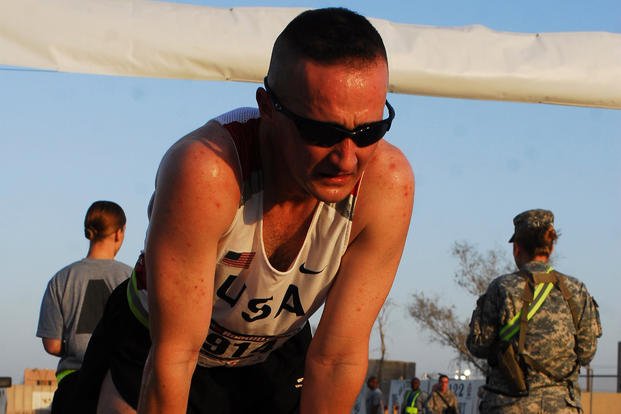Breathing is important in everything we do. From athletic performance, shooting and relaxing, we have had to control our breathing in some fashion. But did you know that you can speed up and slow down your central nervous system by learning some breathing techniques? Did you know you can fail a running test one day, and by learning to breathe properly, you can pass it the next day?
I never really thought about how important breathing is until I compared it with two other things we need to do in order to stay alive. We have all heard that "you can live for weeks without food and only days without water." But did anyone ever add "and only minutes without air?"
It is true. We breathe more than 20,000 times a day. It is the first thing we do when we are born and the last thing we do before we die, so it makes sense to become good at breathing.
Over the past five weeks, I had the honor to work on a contract with the 4th Infantry Division, training soldiers to be better performers both as soldiers and citizens. This program, run by the Magis Group, is all about performance optimization and helps military and law enforcement personnel deal with the stresses of their job and gives them tools to integrate back into society. One of the many tools the soldiers take away from the training is the different types of breathing skills.
The types of breathing that we teach are skills used by professional athletes, NASA astronauts and skilled marksmen, as well as avid runners or swimmers. The following skills will help you relax, pep yourself up and maintain performance as needed for the job you have to do:
Relaxing breath: Has anyone ever come up to you and said, "Relax -- take a breath?" Often when we get anxious or nervous about something, we get to a point where we just react and not control our words or actions. By simply inhaling and exhaling fully for a few minutes, you can slow down your nervous system, and this will allow for you to think clearly, fall asleep or calm your nerves from a stressful day.
Here is how you do it. Inhale through your nose for 3-4 seconds, opening your entire lungs. Make sure you get the bottom part of your lungs full of air, then slowly exhale through your mouth for 6-8 seconds. Your breath ratio is 1:2 inhale to exhale. Measure your pulse, and you will see a difference in your beats per minute. Try this before you go to sleep for a few minutes, and you will find yourself falling asleep faster.
Wakeup breath: Have you ever sat through a long presentation or class, struggling to stay awake, or had long hours on the night shift or guard duty? Here is a way to stimulate your nervous system without having to use caffeine or nicotine. Breathe in and out of your nose as fast as you can but very shallowly for about 15-30 seconds, using only the top of your lungs.
It should resemble a young child about to have a temper tantrum. Your heart rate should increase, and a slight sweat should start to form as you feel blood increasing its flow to your brain.
Running breath: Ever see people running across a finish line of a PFT huffing and puffing uncontrollably? When you learn to breathe, you will learn to run better. Good breathers typically use a pattern of 2-3 steps per inhale and 2-3 steps per exhale. This enables your body to get the needed oxygen to your brain and muscles as well as the carbon dioxide out of your system, which will help you regulate your heart rate and perform better.
This type of 1:1 ratio of inhales to exhales will allow for you not only to perform better physically, but also engage the thinking part of your brain at the same time. This type of breathing can be used tactically and in emergency situations at home or abroad, where your ability to help someone and think how to respond to the situation is required.
Breathing is just one of many skills that can be used to increase your performance, regulate your central nervous system or just relax from a stressful day. Your body needs the ability to recover after any tough workout or stressful day or event. Breathing is a tool I would recommend mastering.
If you have several of these symptoms, take a good look at your daily schedule and find out what is out of balance. This game of stress is a delicate balance of hormonal responses from the speed-up and slow-down sides of our autonomic nervous system. Even though they are automatic responses to life that are difficult to control, we can control how we deal with stress with some serious thought and action.
Stew Smith is a former Navy SEAL and fitness author certified as a Strength and Conditioning Specialist (CSCS) with the National Strength and Conditioning Association. Visit his Fitness eBook store if you're looking to start a workout program to create a healthy lifestyle. Send your fitness questions to stew@stewsmith.com.
Want to Learn More About Military Life?
Whether you're thinking of joining the military, looking for fitness and basic training tips, or keeping up with military life and benefits, Military.com has you covered. Subscribe to Military.com to have military news, updates and resources delivered directly to your inbox.



















